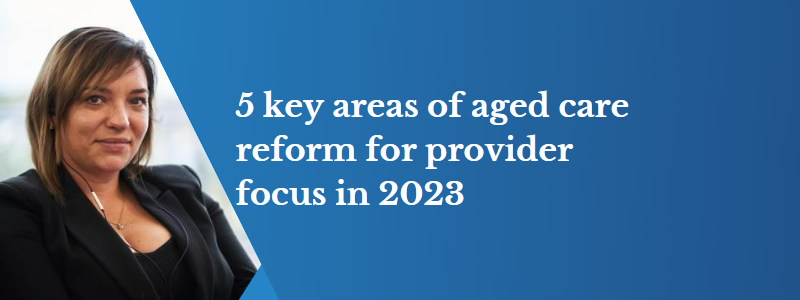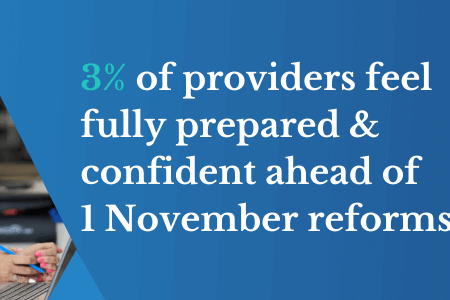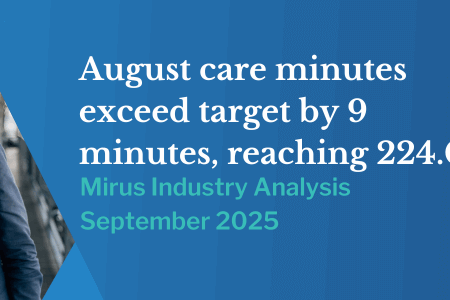5 areas of aged care reform to focus on in Q3
February 3, 2023 | Aged Care Reform

By Katie Airey, Quality, Risk and Compliance Lead
As we kick off 2023, there is an abundance of upcoming changes for the Aged Care sector.
Here are the 5 key areas of aged care reform that providers should focus on during the January to March quarter.
1. Code of Conduct
The new Code of Conduct came into effect on 1 December 2022. Approved providers hold responsibility to ensure that they take reasonable steps to support and prepare their workforce and governing persons to comply with the Code of Conduct.
Providers should ensure that they have;
- Provided training to their workforce and governing personnel
- Reviewed & updated their policies and procedures to reflect the Code of Conduct
- Review their workforce and governing persons performance to ensure they comply with the Code of Conduct.
The Commission will be responsible for overseeing compliance. Failure to comply with the Code of Conduct may result in compliance enforcement action to support providers and/or individuals in how they conduct themselves. In cases where non-compliance is considered severe, the Commission may ban a current or former worker from working in the Aged Care sector, or in an approved provider’s case, they may impose a sanction or revoke the approved provider status. You can find more on the Code of Conduct here.
2. Care Minute Targets
Care minute targets are scheduled to be released on the 14th day in the first month of each quarter through My Aged Care. Providers should review their current workforce roster and analyse their performance against their care minute target.
Where providers find they have under/over performed, a formal review of their consumers AN-ACC class outcomes should be undertaken to identify consumers who have improved care outcomes and those who now require additional support.
There are supports available to help organisations undertake an analysis and determine their optimal performance percentage. It is important that providers understand this concept to enable sustainability and optimal care delivery across their organisation.
Find out more about care minutes and your care obligation.
3. Mandatory Care Minutes
- AN-ACC classification forecasts – Your system/tools should enable you to forecast potential AN-ACC class outcomes. This will support your team to make informed decisions that align with the homes ability to maintain operational efficiency.
- Current AN-ACC classifications – Supporting your team with efficient tools, to track, monitor and analyse their AN-ACC case mix will improve productivity and enable your team to see at a glance consumers AN-ACC classifications, this can then be used to determine if a consumer should be considered for reassessment.
- Care minute targets – Consider if your system/tools allow you to easily view your care minute targets and compare them to your care minute obligations. Without this visibility, it will be challenging for providers to roster adequality to meet their care minute target & their care obligation.
- Scenario planning – The system /tools you use, should have the capability to easily plan possible AN-ACC case mix scenarios. This will enable your team to coordinate roster costs, workforce capacity and skills mix to ensure your organisation improves or maintains star rating performance and is compliant.
- Workforce Planning – Consider what reporting and analysis your current system offers with regards to workforce planning. Providers should routinely undertake workforce planning reviews, comparing rostered care/RN minutes to care minute targets and roster cost for care delivery.
If your current systems and tools do not support your organisation to capture, monitor and proactively respond to changes in your care obligation, our Mirus Works! team can help.
4. Quality Indicators
From the 1 April 2023, Aged Care providers will be required to start collecting data on an additional six Quality Indicators which include;
- Activities of daily living
- Incontinence care
- Hospitalisation
- Workforce
- Consumer experience
- Quality of life
Data collection should occur between 1 April 2023 – 30 June 2023. Data must be submitted in the 1 – 21 July 2023 reporting period.
Providers should consider how they will incorporate the additional assessments required for QI reporting into their clinical framework.
Our quality, risk and compliance team can help you embed efficient processes to enable optimal efficiency in producing reporting data.
5. Mandatory 24/7 Registered Nurse Requirement
From the 1 July 2023, most providers will be required to ensure that they have at least one Registered Nurse onsite and on duty at all times. Providers should consider how they will demonstrate compliance to this requirement, keeping in mind care minute targets and operational performance.
Rostering systems such as Mirus Works!, allows providers to track and report real time data, enabling efficiency in reporting and trend analysis of your organisation’s compliance to new legislated requirements.
Learn more about how to prepare your business for aged care with our reform and transition service or contact us below.


